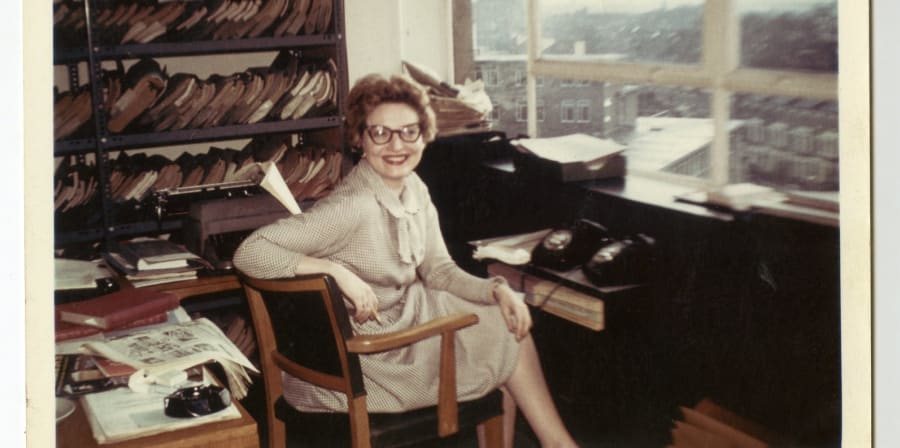We are delighted to share that the Betty Willingale Archive is now catalogued and accessible for research.
About Betty
Betty Willingale was born in Rotherhithe, London, in 1927. Her father was a Thames lighterman.
Betty joined the BBC as a teenager in 1944, working at in the Library at Bush House (International division.). She became part of the early TV drama team.

Her first script editor role was for 'Compact' in 1962. She went on to work as script editor on many well known TV dramas adaptations, and she founded and headed the BBC script unit. One of the best known adaptations she worked on was I, Claudius, 1976, from the novels by Robert Graves, starring Derek Jacobi. She also worked on The Barchester Chronicles, 1982, adapted from the novels by Anthony Trollope. Alan Plater was scriptwriter, with whom she was a frequent collaborator. She gained her production debut in 1983 with the BBC adaptation of Jane Austen's 'Mansfield Park'. She later worked as producer on an adaption of the Olivia Manning trilogy, Fortunes of War. Broadcast in 1987, it starred Kenneth Branagh and Emma Thompson.

When she retired from the BBC in 1988, she worked at Carnival Films, for 10 years, including as a consultant on Jeeves and Wooster, 1990 and as a script editor on Agatha Christie's Poirot, both for Granada, for ITV. She then went on to create and produce the hit series Midsomer Murders for ITV. She was still working until four years before her death at the age of 93. She had a life-long love of detective fiction.
The Archive
The archive includes material from Betty Willingale's home by the executors of her will, Christabel and Brian Eastman. The executors made some selections of material, focusing on that which related to her professional life as a Script Editor and Producer.
The archive emerged organically over the course of Willingale’s career. It includes files of readers reports, compiled during her work for the BBC Script Unit, and selected correspondence and ephemera about different productions on which she worked. The letters in the archive also show that Betty became friends with a number of a wide range of writers, actors, producers and others in the television industry. The archive also contains her copies of books relating to TV adaptations that she worked on.
Betty’s papers are a great case study of a woman forging a career path in television during the development of the television drama genre itself. Betty’s career at the BBC coincides with the development of television in Britain. When she joined in 1944, age 16/17, the first BBC television broadcast had been only 8 years before, in 1936.
Television broadcasts were paused during the Second World War (1939-1945), with the BBC focusing on radio only, and then they resumed a TV schedule in June 1946. In the early years the format of television drama was very much coming from a Theatre background: plays performed in front of the camera.
When Betty joined the script unit in 1962, this was referred to as the ‘Golden age’ of TV Drama. Her career runs alongside the development of this new medium, the television serial drama, which continues into the present in new online channels and streaming services like Netflix, Amazon Prime and BBC iplayer.
Why UAL?
UAL ASCC’s collections support teaching and research at the university, across all creative disciplines. Betty Willingale’s papers offer a new window into the world of 20th Century television drama adaptation, production and media. They complement a previous donation (also by Brian and Christabel) of the papers of the well-known script writer Clive Exton, known for his work on ITV’s hit series, ‘Agatha Christie’s Poirot’ on which Betty also worked. [View the Clive Exton archive catalogue]

How the archive is being used
As well as being available for independent research in our reading rooms, we use our archives to support teaching across the university.
The cataloguing of the Betty Willingale archive was completed in October 2023. This summer term 2024, it was used in teaching for the first time. I supported a group of students from the MA Culture, Criticism and Curation course, at Central St Martins.
They worked with one section of Betty’s Archive, the Readers’ Reports from the BBC, on a project to create an online exhibition through the medium of sound, based on their research.
They became fascinated by the multiplicity of interpretations that can happen with an archive, even a small one such as Betty’s.

The students drew out many different themes and critical approaches to the archive including:
- The process of adaptation and interpretation from novel to screen as well as from archive to new research.
- The power relations involved in commissioning and broadcasting.
- Britain in the 1970s – including on the one hand, the growth and development of feminism, on the other hand, financial hardship, political turmoil; overt and more subtle forms of racism and colonialism.
- Glimpsing the person behind the archive: Betty herself, as an individual and in her roles in television. How the memory of a person lives on in an archive and what is missed from the historical record.
How to access the archive
The archive is now fully catalogued and available for research at the Archives and Special Collection Centre.
You can view the Betty Willingale archive catalogue
Betty’s book collection has been listed through the Library Catalogue. View Betty's book collection on the Library Catalogue
To book an appointment with us to view items from Betty’s archive or her books, please email us at archive-enquiries@arts.ac.uk

